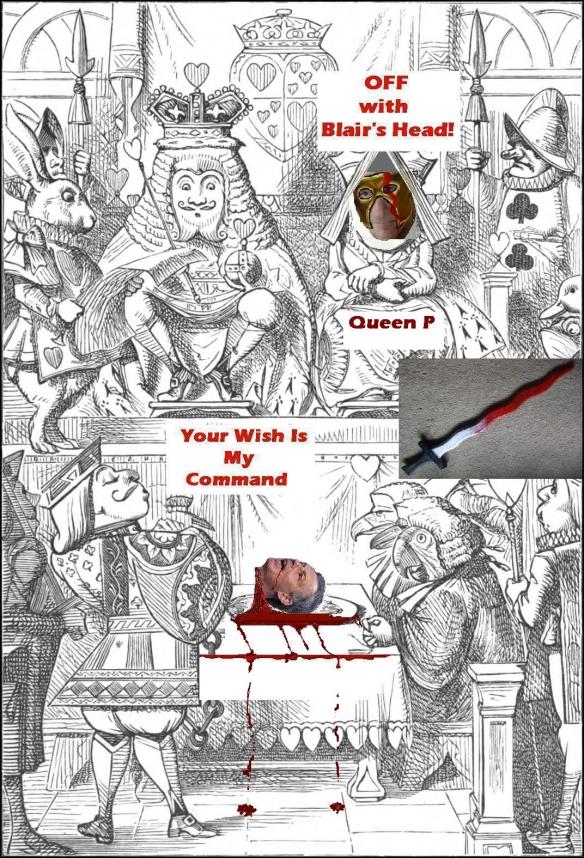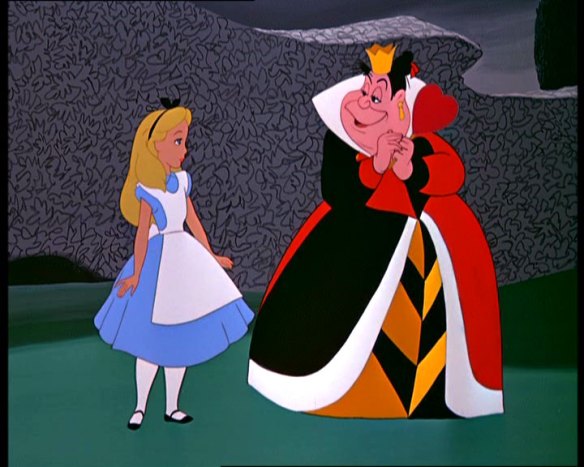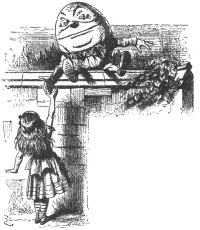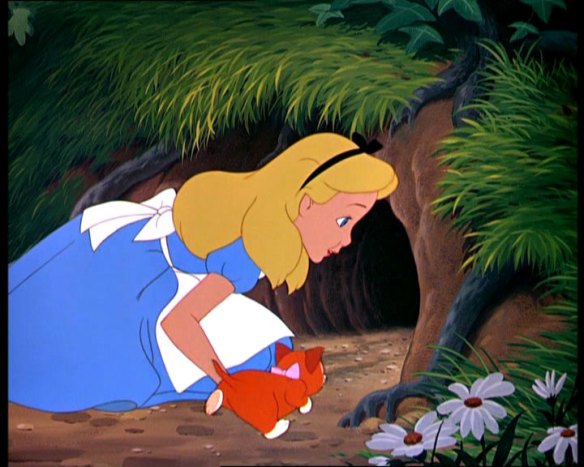Comment at end
 Or –
Or –
1st February 2012
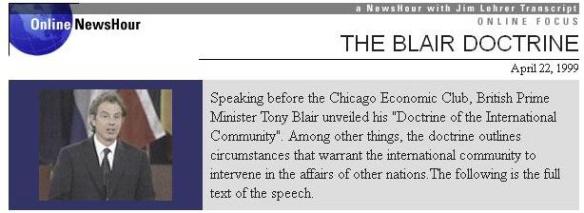
[Jump here if you can’t wait to read all of Tony Blair’s 1999 Chicago speech]
But it might be worth a quick read of the below (in grey) in order that you know why the international community is disgracefully lacking in its behaviour as regards the RtP.
It seems quite a few have never heard of the ‘Responsibility to Protect’. It was added to the UN Charter in 2005 AFTER Tony Blair and others of the interventionist mindset had embarrassed the UN by intervening WITHOUT United Nations mandates in such as Kosovo. (See here, Responsibility to Protect)
Excerpt:
Background: The emergence of the concept of “humanitarian intervention”
Following the 1994 genocide in Rwanda and ethnic cleansing in the Balkans and Kosovo in 1995 and 1999, the international community began to seriously debate how to react effectively when citizens’ human rights are grossly and systematically violated. The issue at the heart of the matter was whether States have unconditional sovereignty over their affairs or whether the international community has the right to intervene militarily in a country for humanitarian purposes.
It was during this period in the 1990s, with incidents in Somalia, Rwanda, Srebrenica and Kosovo, that the discussion of a “right to humanitarian intervention” evolved into the concept of a “responsibility to protect”.
In his Millennium Report of 2000, then Secretary-General Kofi Annan, recalling the failures of the Security Council to act in a decisive manner in Rwanda and Kosovo, put forward the challenge to Member States:
“If humanitarian intervention is, indeed, an unacceptable assault on sovereignty, how should we respond to a Rwanda, to a Srebrenica, to gross and systematic violation of human rights that offend every precept of our common humanity?”
Hat tip for the speech below to PBS Online News Hour
____________________
The Blair Doctrine, April 22nd 1999
PRIME MINISTER BLAIR: It is a great pleasure to be here in Chicago this evening and addressing the Economic Club. My thanks to your Chairman, Phil Rooney, and your President, Grace Barry. My thanks too to Mayor Daley for your kindness in welcoming me here.
I must start this evening by saying, on behalf of the British people, how saddened we are by the tragic events in Linleton on Tuesday. For us it brings back sad memories of a school tragedy of our own on 13 March 1996 in a small town called Dunblane in Scotland when 16 children and a teacher died in a hail of bullets. From us in Britain to you here in the United States: we offer you our deepest sympathy, our thoughts and our prayers.
1 am absolutely delighted to be the first serving British Prime Minister to visit Chicago. I wanted to come here to the heart of this great country. To a great cosmopolitan city and the capital of middle America.
Despite the absence of Prime Ministerial visits, there is a long British history with Chicago We set up our Consulate here in 1855.
Marshall Field opened their first overseas buying office in Manchester in 1870. One of Field’ s shop assistants subsequently opened his own store in London in 1909. His name was Harry Selfridge. He employed the same architect who designed your City Hall to build Selfridge’s, the landmark store on London’s Oxford Street.
That sort of interchange goes on today too. Chicagoland is the headquarters of some of Britain’s most important inward investors: Motorola, Sara Lee, RR Donnelly. Nearly half the $124 billion US firms spent on foreign acquisitions last year went on British companies. We would like it to be even more.
Nor is the traffic all one way. British investment in Illinois generates some 46,000 jobs, making us the biggest foreign investor in the State. And the London Futures Exchange is working alongside your Board of Trade and Mercantile Exchange to lead the revolution in electronic trading. The London Futures Exchange looks forward to receiving early CFTC approval for its system to be installed here.
Kosovo
While we meet here in Chicago this evening, unspeakable things are happening in Europe. Awful crimes that we never thought we would see again have reappeared – ethnic cleansing. systematic rape, mass murder.
I want to speak to you this evening about events in Kosovo. But I want to put these events in a wider context – economic, political and security – because I do not believe Kosovo can be seen in isolation.
No one in the West who has seen what is happening in Kosovo can doubt that NATO’s military action is justified. Bismarck famously said the Balkans were not worth the bones of one Pomeranian Grenadier. Anyone who has seen the tear stained faces of the hundreds of thousands of refugees streaming across the border, heard their heart-rending tales of cruelty or contemplated the unknown fates of those left behind, knows that Bismarck was wrong.
This is a just war, based not on any territorial ambitions but on values. We cannot let the evil of ethnic cleansing stand. We must not rest until it is reversed. We have learned twice before in this century that appeasement does not work. If we let an evil dictator range unchallenged, we will have to spill infinitely more blood and treasure to stop him later.
But people want to know not only that we are right to take this action but also that we have clear objectives and that we are going to succeed.
We have five objectives: a verifiable cessation of all combat activities and killings; the withdrawal of Serb military, police and paramilitary forces from Kosovo; the deployment of an international military force, the return of all refugees and unimpeded access for humanitarian aid; and a political framework for Kosovo building on the Ramnbouillet accords. We will not negotiate on these aims. Milosevic must accept them.
Through the air campaign, we have destroyed the greater part of Milosevic’s operational airforce; a quarter of his SAM radar systems – the rest do not operate for fear of being destroyed; his oil refineries and the lines of communication into Kosovo; his military infrastructure including his means of command and communication; and a good part of his ammunition dumps. The morale of the Yugoslav army is beginning to crack. And the KLA is now larger and has more support than when Milosevic started his campaign.
We have always made clear this campaign will take time. We will not have succeeded until an international force has entered Kosovo and allowed the refugees to return to their homes. Milosevic will have no veto on the entry of this international force.
Just as I believe there was no alternative to military action, now it has started I am convinced there is no alternative to continuing until we succeed. On its 50th birthday NATO must prevail. Milosevic had, I believe, convinced himself that the Alliance would crack. But I am certain that this weekend’s Summit in Washington under President Clinton’s leadership will make our unity and our absolute resolve clear for all to see. Success is the only exit strategy I am prepared to consider.
We need to begin work now on what comes after our success in Kosovo. We will need a new Marshall plan for Kosovo, Montenegro, Macedonia, Albania and Serbia too if it turns to democracy. We need a new framework for the security of the whole of the Balkans. And we will need to assist the war crimes tribunal in its work to bring to justice those who have committed these appalling crimes.
This evening I want to step back and look at what is happening in Kosovo in a wider context
Global Interdependence
Twenty years ago we would not have been fighting in Kosovo. We would have turned our backs on it. The fact that we are engaged is the result of a wide range of changes – the end of the Cold War; changing technology; the spread of democracy. But it is bigger than that
I believe the world has changed in a more fundamental way. Globalisation has transformed our economies and our working practices. But globalisation is not just economic. It is also a political and security phenomenon.
We live in a world where isolationism has ceased to have a reason to exist. By necessity we have to co-operate with each other across nations.
Many of our domestic problems are caused on the other side of the world. Financial instability in Asia destroys jobs in Chicago and in my own constituency in County Durham. Poverty in the Caribbean means more drugs on the streets in Washington and London. Conflict in the Balkans causes more refugees in Germany and here in the US. These problems can only be addressed by international co-operation.
We are all internationalists now, whether we like it or not We cannot refuse to participate in global markets if we want to prosper. We cannot ignore new political ideas in other counties if we want to innovate. We cannot turn our backs on conflicts and the violation of human rights within other countries if we want still to be secure.
On the eve of a new Millennium we are now in a new world. We need new rules for international co-operation and new ways of organising our international institutions.
After World War II, we developed a series of international institutions to cope with the strains of rebuilding a devastated world: Bretton Woods, the United Nations, NATO, the FU. Even then, it was clear that the world was becoming increasingly interdependent. The doctrine of isolationism had been a casualty of a world war, where the United States and others finally realised standing aside was not an option.
Today the impulse towards interdependence is immeasurably greater. We are witnessing the beginnings of a new doctrine of international community. By this I mean the explicit recognition that today more than ever before we are mutually dependent, that national interest is to a significant extent governed by international collaboration and that we need a clear and coherent debate as to the direction this doctrine takes us in each field of international endeavour. Just as within domestic politics, the notion of community – the belief that partnership and co-operation are essential to advance self-interest – is coming into its own; so it needs to find its own international echo. Global financial markets, the global environment, global security and disarmament issues: none of these can he solved without intense international co-operation.
As yet, however, our approach tends towards being ad hoc. There is a global financial crisis: we react, it fades; our reaction becomes less urgent. Kyoto can stimulate our conscience about environmental degradation but we need constant reminders to refocus on it. We are continually fending off the danger of letting wherever CNN roves, be the cattle prod to take a global conflict seriously.
We need to focus in a serious and sustained way on the principles of the doctrine of international community and on the institutions that deliver them. This means:
1.In global finance, a thorough, far-reaching overhaul and reform of the system of international financial regulation. We should begin it at the G7 at Cologne.
2.A new push on free trade in the WTO with the new round beginning in Seattle this autumn.
3.A reconsideration of the role, workings and decision-making process of the UN, and in particular the UN Security Council.
4 For NATO, once Kosovo is successfully concluded, a critical examination of the lessons to be learnt, and the changes we need to make in organisation and structure.
5.In respect of Kyoto and the environment, far closer working between the main industrial nations and the developing world as to how the Kyoto targets can be met and the practical measures necessary to slow down and stop global warming, and
6.A serious examination of the issue of third world debt, again beginning at Cologne.
In addition, the EU and US should prepare to make real step-change in working more closely together. Recent trade disputes have been a bad omen in this regard. We really are failing to see the bigger picture with disputes over the banana regime or hushkits or whatever else. There are huge issues at stake in our co-operation. The EU and the US need each other and need to put that relationship above arguments that are ultimately not fundamental.
Now is the time to begin work in earnest on these issues. I know President Clinton will stand ready to give a lead on many of them. In Kosovo but on many other occasions, I have had occasion to be truly thankful that the United States has a President with his vision and steadfastness.
Globalisation
Globalisation is most obvious in the economic sphere. We live in a completely new world. Every day about one trillion dollars moves across the foreign exchanges, most of it in London. Here in Chicago the Mercantile Exchange and the Chicago Board of Trade contracts worth more than $1.2 billion per day.
Any Government that thinks it can go it alone is wrong. If the markets don’t like your policies they will punish you.
The same is true of trade. Protectionism is the swiftest road to poverty. Only by competing internationally can our companies and our economics grow and succeed. But it has to be an international system based on rules. That means accepting the judgements of international organisations even when you do not like them. And it means using the new trade round to be launched at Seattle to extend free trade.
The international financial system is not working as it should. The Asian financial crisis of last year, and the knock on impact on Brazil, demonstrate that.
The fact is that the Bretton Woods machinery was set up for the post war world. The world has moved on. And we need to modernise the international financial architecture to make it appropriate for the new world.
The lesson of the Asian crisis is above all that it is better to invest in countries where you have openness, independent central banks, properly functioning financial systems and independent courts, where you do not have to bribe or rely on favours from those in power.
We have therefore proposed that we should make greater transparency the keystone of reform. Transparency about individual countries’ economic policies through adherence to new codes of conduct on monetary and fiscal policy; about individual companies’ financial positions through new internationally agreed accounting standards and a new code of corporate governance; and greater openness too about IMF and World Bank discussions and policies.
We also need improved financial supervision both in individual countries through stronger and more effective peer group reviews, and internationally through the foundation of a new Financial Stability Forum. And we need more effective ways of resolving crises, like that in Brazil. The new contingent credit line at the IMF will assist countries pursuing sensible economic reforms and prevent damaging contagion. But we should also think creatively about how the private sector can help to resolve short-term financial crises.
Secretary Rubin and Chancellor Gordon Brown both put forward ideas yesterday. They highlighted the progress already made on improving transparency and in developing internationally agreed standards, particularly for the financial sector. But both identified the key challenges going forward, including how to involve the private sector in the prevention and resolution of crises. G7 Finance Ministers will be discussing these issues next week. I want to see agreement on the key outstanding questions reached by the Cologne Summit.
I hope the Summit will go further too in the case of Russia. We simply cannot stand back and watch that great nation teeter on the brink of ruin. If it slides into the abyss, it will affect all of us. A democratic, outward looking, prosperous Russia is of key importance to the West. We must not let our current differences set us on a route towards the mutual hostility and suspicion which has too often characterised our relationship in the past.
I very much hope that Russia and the IMF can reach an early agreement on a new programme to provide macro-economic stability, avoid hyper-inflation and encourage Russian companies and savers to keep their own money in the country. This however will only be a first step. I want to see a wider dialogue between Russia and the G7 focussing on all of the structural and legal reforms that are needed to improve the economic prospects for ordinary Russians. Russia is a unique economy with its own special problems and its own unique potential. We all need to build on the lessons of the last few years and develop a long term strategy for reform that respects Russia’s history, her culture and her aspirations. If Russia is prepared, with our understanding and co-operation, to take the difficult economic action it needs to reform its economy – to build a sound and well-regulated financial system, to restructure and close down bankrupt enterprises to develop and enforce a clear and fair legal system and to reduce the damage caused by nuclear waste – the G7 must be prepared to think imaginatively about how it can best support these efforts.
We will be putting forward concrete ideas on how to do this at the Cologne Summit – by opening up our markets to Russian products. by providing technical advice and sharing our expertise with the Russians, by providing support both bilaterally and through the 1MF. the World Bank and the other lEls and the Paris Club for the Russian reform efforts.
I believe passionately that we will all benefit hugely from a thriving Russia making use of its immense natural resources, its huge internal market and its talented and x~eIl-educated people. Russia’s past has been as a world power that we felt confronted by. We must work with her to make her future as a world power with whom we co-operate in trust and to mutual benefit.
International Security
The principles of international community apply also to international security.
We now have a decade of experience since the end of the Cold War. It has certainly been a less easy time than many hoped in the euphoria that followed the collapse of the Berlin Wall. Our armed forces have been busier than ever – delivering humanitarian aid, deterring attacks on defenceless people, backing up UN resolutions and occasionally engaging in major wars as we did in the Gulf in 1991 and are currently doing in the Balkans.
Have the difficulties of the past decade simply been the aftershocks of the end of the Cold War? Will things soon settle down, or does it represent a pattern that will extend into the future?
Many of our problems have been caused by two dangerous and ruthless men – Saddam Hussein and Slobodan Milosevic. Both have been prepared to wage vicious campaigns against sections of their own community. As a result of these destructive policies both have brought calamity on their own peoples. Instead of enjoying its oil wealth Iraq has been reduced to poverty, with political life stultified through fear. Milosevic took over a substantial, ethnically diverse state, well placed to take advantage of new economic opportunities. His drive for ethnic concentration has left him with something much smaller, a ruined economy and soon a totally wined military machine
One of the reasons why it is now so important to win the conflict is to ensure that others do not make the same mistake in the future. That in itself will be a major step to ensuring that the next decade and the next century will not be as difficult as the past. If NATO fails in Kosovo, the next dictator to be threatened with military force may well not believe our resolve to carry the threat through.
At the end of this century the US has emerged as by far the strongest state. It has no dreams of world conquest and is not seeking colonies. If anything Americans are too ready to see no need to get involved in affairs of the rest of the world. America’s allies are always both relieved and gratified by its continuing readiness to shoulder burdens and responsibilities that come with its sole superpower status. We understand that this is something that we have no right to take for granted, and must match with our own efforts. That is the basis for the recent initiative I took with President Chirac of France to improve Europe’s own defence capabilities.
As we address these problems at this weekend’s NATO Summit we may be tempted to think back to the clarity and simplicity of the Cold War. But now we have to establish a new framework. No longer is our existence as states under threat. Now our actions are guided by a more subtle blend of mutual self interest and moral purpose in defending the values we cherish. In the end values and interests merge. If we can establish and spread the values of liberty, the rule of law, human rights and an open society then that is in our national interests too. The spread of our values makes us safer. As John Kennedy put it “Freedom is indivisible and when one man is enslaved who is free?”
The most pressing foreign policy problem we face is to identify the circumstances in which we should get actively involved in other people’s conflicts. Non -interference has long been considered an important principle of international order. And it is not one we would want to jettison too readily. One state should not feel it has the right to change the political system of another or forment subversion or seize pieces of territory to which it feels it should have some claim. But the principle of non-interference must be qualified in important respects. Acts of genocide can never be a purely internal matter. When oppression produces massive flows of refugees which unsettle neighbouring countries then they can properly be described as “threats to international peace and security”. When regimes are based on minority rule they lose legitimacy – look at South Africa.
Looking around the world there are many regimes that are undemocratic and engaged in barbarous acts. If we wanted to right every wrong that we see in the modern world then we would do little else than intervene in the affairs of other countries. We would not be able to cope.
So how do we decide when and whether to intervene. I think we need to bear in mind five major considerations
First, are we sure of our case? War is an imperfect instrument for righting humanitarian distress; but armed force is sometimes the only means of dealing with dictators. Second, have we exhausted all diplomatic options? We should always give peace every chance, as we have in the case of Kosovo. Third, on the basis of a practical assessment of the situation, are there military operations we can sensibly and prudently undertake? Fourth, are we prepared for the long term? In the past we talked too much of exit strategies. But having made a commitment we cannot simply walk away once the fight is over; better to stay with moderate numbers of troops than return for repeat performances with large numbers. And finally, do we have national interests involved? The mass expulsion of ethnic Albanians from Kosovo demanded the notice of the rest of the world. But it does make a difference that this is taking place in such a combustible part of Europe.
I am not suggesting that these are absolute tests. But they are the kind of issues we need to think about in deciding in the future when and whether we will intervene.
Any new rules however will only work if we have reformed international institutions with which to apply them.
If we want a world ruled by law and by international co-operation then we have to support the UN as its central pillar. But we need to find a new way to make the UN and its Security Council work if we are not to return to the deadlock that undermined the effectiveness of the Security Council during the Cold War. This should be a task for members of the Permanent Five to consider once the Kosovo conflict is complete.
Politics
This speech has been dedicated to the cause of internationalism and against isolationism. On Sunday, along with other nation’s leaders, including President Clinton, I shall take part in a discussion of political ideas. It is loosely based around the notion of the Third Way, an attempt by centre and centre-left Governments to re-define a political programme that is neither old left nor 1980s right. In the field of politics, too, ideas are becoming globalised. As problems become global – competitivity, changes in technology, crime, drugs, family breakdown – so the search for solutions becomes global too. What amazes me, talking to other countries’ leaders, is not the differences but the points in common. We are all coping with the same issues: achieving prosperity in a world of rapid economic and technological change; social stability in the face of changing family and community mores; a role for Government in an era where we have learnt Big Government doesn’t work, but no Government works even less.
Certain key ideas and principles are emerging. Britain is following them. It is one of the things that often makes it difficult for commentators to define the New Labour Government. We are parodied as either being Mrs Thatcher with a smile instead of a handbag; or as really old-style socialists in drag, desperate to conceal our true identity. In reality, we are neither. The political debates of the 20th century – the massive ideological battleground between left and right – are over. Echoes remain, but they mislead as much as they illuminate.
Let me summarise the new political agenda we stand for:
1.Financial prudence as the foundation of economic success. In Britain, we have eliminated the massive Budget deficit we inherited; put in new fiscal rules; granted Bank of England independence – and we’re proud of it.
2.On top of that foundation, there is a new economic role for Government. We don’t believe in laissez-faire. But the role is not picking winners, heavy handed intervention, old-style corporatism, but: education, skills, technology, small business entrepreneurship. Of these, education is recognised now as much for its economic as its social necessity. It is our top priority as a Government.
3.We are reforming welfare systems and public services. In Britain, we are introducing measures to tackle failing schools and reform the teaching profession that would have been unthinkable by any Government even a few years ago. Plus big changes to the NHS. For the first two years of this Government, welfare bills have fallen for the first time in two decades.
4.We are all tough on crime, tough on the causes of crime. The debate between “liberals” and “hardliners” is over. No one disputes the causes of crime. In particular social exclusion – a hardcore of society outside its mainstream – needs a special focus. We won’t solve it just by general economic success. But we don’t excuse crime either. Criminals get punished. That’s justice.
5.We are reinventing or reforming Government itself. The Government machine is being overhauled. Here, Al Gore has led the way. But the whole basis of how we deliver Government services is being altered.
For Britain. there is a special dimension to this.
We are modernising our constitution. We have devolved power to a new Parliament in Scotland and a new Assembly in Wales. We are handing power back to local government, because we believe that power should be exercised as close as possible to the people it affects. We have introduced the concept of elected Mayors which, strange as it may seem to you here in Chicago, has not existed in the past in Britain. The first election for a Mayor of London will take place next year. And we are removing the constitutional anomalies from the past, like hereditary peers voting on legislation, that have proved too difficult to tackle previously.
We also want to change the way in which Northern Ireland is governed, and let me say something on this.
We have made great progress in bringing peace to Northern Ireland. The Good Friday Agreement last year was a breakthrough. We have to make one last heave to get over the one remaining obstacle, so that we can establish the executive and the North/South bodies and hand over power to the elected Assembly. The stand off on decommissioning cannot be allowed to de-rail the process when we have come so far. Bertie Ahern, the Irish Taoiseach, and I are determined to find a way through. The people will never forgive the politicians unless we resolve it.
And I would like to thank President Clinton and the Irish American community in the US for the great contribution they have made to coming this far. I know you will assist us again in the final straight.
And the final thing we all have in common, the new centre, centre-left Governments, is we are internationalists and that returns me to my original theme.
For Britain, the biggest decision we face in the next couple of decades is our relationship with Europe. For far too long British ambivalence to Europe has made us irrelevant in Europe, and consequently of less importance to the United States. We have finally done away with the false proposition that we must choose between two diverging paths – the Transatlantic relationship or Europe. For the first time in the last three decades we have a government that is both pro-Europe and pro-American. I firmly believe that it is in Britain’s interest, but it is also in the interests of the US and of Europe.
Being pro-Europe does not mean that we are content with the way it is. We believe it needs radical reform. And I believe we are winning the battle for economic reform within the EU. Two weeks ago the Conservative Spanish Prime Minister and I issued a joint Declaration on economic reform. Shortly, the German Social Democratic Chancellor Schroeder and I will be issuing a declaration on the same subject. We all understand the need to ensure flexible labour markets, to remove regulatory burdens and to untie the hands of business if we are going to succeed. The tide of Euro-sclerosis has begun to turn: the Third Way in Europe as much as in Britain.
As to Britain and the Euro, we will make our decision not on political grounds but on the basis of our national economic interests. We must however ensure that we are ready to enter if we make the decision to do so. And the government has put a national changeover plan in place to convert sterling that will make that possible if we decide to do so.
I also pledge that we will prevent the European Union becoming a closed fortress. Europe must he a force for openness and free trade. Indeed it is fundamental to my whole thesis tonight that we can only survive in a global world if we remove barriers and improve co-operation.
Conclusion
This has been a very broad-ranging speech, but maybe the time is right for that. One final word on the USA itself. You are the most powerful country in the world, and the richest. You are a great nation. You have so much to give and to teach the world; and I know you would say, in all modesty, a little to learn from it too. It must be difficult and occasionally irritating to find yourselves the recipient of every demand, to be called upon in every crisis, to be expected always and everywhere to do what needs to be done. The cry “What’s it got to do with us” must be regularly heard on the lips of your people and be the staple of many a politician running for office.
Yet just as with the parable of the individuals and the talents, so those nations which have the power, have the responsibility. We need you engaged. We need the dialogue with you. Europe over time will become stronger and stronger; but its time is some way off.
I say to you: never fall again for the doctrine of isolationism. The world cannot afford it. Stay a country, outward-looking, with the vision and imagination that is in your nature. And realise that in Britain you have a friend and an ally that will stand with you, work with you, fashion with you the design of a future built on peace and prosperity for all, which is the only dream that makes humanity worth preserving.
____________________
Back to top
__________
Click to Buy Tony Blair’s ‘A Journey’
Comment samples follow from the Ban Blair-Baiting petition
1. I completely agree with everything that has been said on this website. As Prime Minister, Tony Blair worked tirelessly and selflessly in the interests of the people, and continues to do so today. He is primarily a humanitarian, and doesn’t deserve any of the vitriol that has been levelled at him. He was a great Prime Minister, is a thoroughly decent man; and should in my opinion, be awarded the Nobel Peace Prize for his outstanding work. – David Miliband (New Labour’s heir) for the next PM!
2. Best politician in Britain by a long way.
3. Fully support the petition. The criticism of Mr Blair has gone way beyond anything acceptable and seems to be carried out mainly by those who are looking to wash their hands of any involvement in supporting the Iraq war at the time. It is very easy to be ‘wise after the event’ and to make assumptions about how much Mr Blair knew or did not know before the war. In these people’s eyes, the former PM is guilty whatever the evidence.
4. An excellent petition this for a very undervalued PM. A PM who is not only the best in my lifetime but my parents lifetime too!
See full signature list







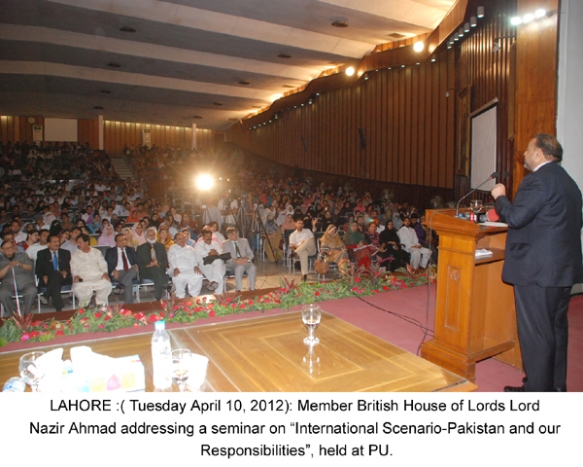



 John Rentoul
John Rentoul  James Dobson You DO suppress. You’re so fearful of extremist views you think they should be illegal. Don’t hide your own views.
James Dobson You DO suppress. You’re so fearful of extremist views you think they should be illegal. Don’t hide your own views.
